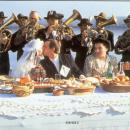Ked mi kardtka prišla narukovat
začeli mi slizi z oču padat
Mili musikanti zahrajte mi čerdaš
pervego oktobra mam rukovat
Mili musikanti zahrajte mi čerdaš
pervego oktobra mam rukovat
Kana gardka kudlu ko slugadža,
začinde te rovel mire jakha,
mire lavutara bašaven čardaši(s),
kaj mange te khelav mira dake
mire lavutara bašaven čardaši(s),
kaj mange te khelav mira dake
začeli mi slizi z oču padat
Mili musikanti zahrajte mi čerdaš
pervego oktobra mam rukovat
Mili musikanti zahrajte mi čerdaš
pervego oktobra mam rukovat
Kana gardka kudlu ko slugadža,
začinde te rovel mire jakha,
mire lavutara bašaven čardaši(s),
kaj mange te khelav mira dake
mire lavutara bašaven čardaši(s),
kaj mange te khelav mira dake
inviata da Gustavo Sierra - 25/6/2011 - 12:55
Saludos.
El autor de este blog http://gypsylyrics.wordpress.com dio con vuestra página y recogió esta canción. Le encontré, y sin darme cuenta le pregunté lo mismo.
Hoy un tercer comentarista, desde Ucrania, dejó este comentario: por lo visto, según él, es una canción ucraniana de la Primera Guerra Mundial, pero desconoce cómo llegó a ser adaptada por los gitanos:
Actually, this song is not gypsies’. It is really the WWI song, and a folk song, but it has a Western Ukrainian origin. Look at this: http://www.youtube.com/watch?v=14KBKNbPDMk
And there are four versions of the song lyrics:
http://www.pisni.org.ua/songs/1191101.html
http://www.pisni.org.ua/songs/213879.html
http://www.pisni.org.ua/songs/214267.html
http://www.pisni.org.ua/songs/614271.html
They are in the Ukrainian language, but i hope that google translate will help you. The lyrics are similar to lyrics on this page, and they have musicants and csardas too, but i don’t know, how exactly this song came to gypsies. Maybe, gypsy text was created in the modern time (i hope it is not true).
Also, you can google Ukrainian name of the song, “Кедь ми прийшла карта”.
(Alexander Abashev, en http://gypsylyrics.wordpress.com/2011/...)
El autor de este blog http://gypsylyrics.wordpress.com dio con vuestra página y recogió esta canción. Le encontré, y sin darme cuenta le pregunté lo mismo.
Hoy un tercer comentarista, desde Ucrania, dejó este comentario: por lo visto, según él, es una canción ucraniana de la Primera Guerra Mundial, pero desconoce cómo llegó a ser adaptada por los gitanos:
Actually, this song is not gypsies’. It is really the WWI song, and a folk song, but it has a Western Ukrainian origin. Look at this: http://www.youtube.com/watch?v=14KBKNbPDMk
And there are four versions of the song lyrics:
http://www.pisni.org.ua/songs/1191101.html
http://www.pisni.org.ua/songs/213879.html
http://www.pisni.org.ua/songs/214267.html
http://www.pisni.org.ua/songs/614271.html
They are in the Ukrainian language, but i hope that google translate will help you. The lyrics are similar to lyrics on this page, and they have musicants and csardas too, but i don’t know, how exactly this song came to gypsies. Maybe, gypsy text was created in the modern time (i hope it is not true).
Also, you can google Ukrainian name of the song, “Кедь ми прийшла карта”.
(Alexander Abashev, en http://gypsylyrics.wordpress.com/2011/...)
Gustavo Sierra Fernández - 7/9/2012 - 00:02
Lingua: Ucraino
Una de las versiones facilitadas por el comentarista ucraniano
Кедь ми прийшла карта на роковать,
Став я свого неня просити, благать.
Неню ж ти, мій, неню, вчинь ми таку волю
Йди за мене служить на ту войну.
Кедь ми прийшла карта на роковать
Став я музикантів просити, благать.
Гей ви, музиканти, заграйте ми чардаш,
Най си погуляю в той останній раз
Стали музиканти чардаш грати,
Стали ми ся сльози з очей лляти,
Ніхто не заплаче, ні отец ні матка,
Лем за мнов заплачуть три дівчатка
Ой одна заплаче, бо я її брат,
А друга заплаче, бо я її сват,
А третя заплаче, бо плакати мусить,
Бо вона від мене перстень носить
Став я свого неня просити, благать.
Неню ж ти, мій, неню, вчинь ми таку волю
Йди за мене служить на ту войну.
Кедь ми прийшла карта на роковать
Став я музикантів просити, благать.
Гей ви, музиканти, заграйте ми чардаш,
Най си погуляю в той останній раз
Стали музиканти чардаш грати,
Стали ми ся сльози з очей лляти,
Ніхто не заплаче, ні отец ні матка,
Лем за мнов заплачуть три дівчатка
Ой одна заплаче, бо я її брат,
А друга заплаче, бо я її сват,
А третя заплаче, бо плакати мусить,
Бо вона від мене перстень носить
inviata da Gustavo Sierra Fernández - 15/9/2012 - 11:37
Lingua: Inglese
Traducción al inglés propiciada por el mismo comentarista
http://gypsylyrics.wordpress.com/2011/...
http://gypsylyrics.wordpress.com/2011/...
When I had received my call-up papers,
I began to ask my dad:
“My dad, dad, do me a favor,
Go to the war instead of me”.
When I had received my call-up papers,
I began to ask musicians:
“Hey you, musicians, play csardas for me,
Let me to have fun in my youth time,
Hey you, musicians, play csardas for me,
Let me to have fun in the last time”.
Musicians began to play csardas,
And tears began to pour from my eyes,
Nobody will cry, neither father nor mother,
Only three girls will cry for me.
And the first one will cry, because I am her brother,
And the second will cry, because I am her matchmaker,
And the third will cry, because she must,
Because she brings my ring.
I began to ask my dad:
“My dad, dad, do me a favor,
Go to the war instead of me”.
When I had received my call-up papers,
I began to ask musicians:
“Hey you, musicians, play csardas for me,
Let me to have fun in my youth time,
Hey you, musicians, play csardas for me,
Let me to have fun in the last time”.
Musicians began to play csardas,
And tears began to pour from my eyes,
Nobody will cry, neither father nor mother,
Only three girls will cry for me.
And the first one will cry, because I am her brother,
And the second will cry, because I am her matchmaker,
And the third will cry, because she must,
Because she brings my ring.
inviata da Gustavo Sierra Fernández - 15/9/2012 - 11:39
Nuestro comentarista nos advierte de que no usemos el vídeo que nos facilitó, porque, por lo visto, esta canción ucraniana de la I Guerra Mundial -que aún sigo intentando averiguar como llegó al pueblo Rrom- se convirtió en Ucrania en himno de los admiradores de los fascistas y colaboracionistas ucranianos con los nazis: según se desprende de sus palabras, esto ha ocurrido en tiempos más recientes, probablemente porque se entienda que los simpatizantes ucranianos del nazismo no querían ir a la guerra junto a Stalin contra Alemania.
Seguiré trayendo más información a medida que avance en mi "investigación".
Seguiré trayendo más información a medida que avance en mi "investigación".
Gustavo Sierra Fernández - 15/9/2012 - 11:44
Hello.
Primarily: sorry, I'm not a Ukrainian commentator, I'm from Russia.
And about the subject: I searched on the Internet about this song too, and found some information.
Firstly, it's a Lemkos song. Majority of commentators on the Internet says that, so, I suppose, we can believe them.
Secondly, there are many versions of this song, not only Czech and Ukrainian, but also Slovak and Polish (not exactly Polish, rather Lemko-Polish dialect). By the way, the Polish Lemko version is very interesting, because there the lyrical hero ask about the favor to his DEAD father: "Rise up, dad, from your grave, do me a favor, Go to the war instead of me".
And thirdly, I tried to find other Gypsy version of the song, and it turns out, that there is only the Gothart variant of the lyrics, literally, including the same orthography in different sources. I searched in different ways, by using different words from the Gypsy text, like "kana lavutara mire", and "kana gardka", and "lavutara mire jakha". All these words, except "gardka", really exist in Gypsy language and they can be googled separately. So, we can conclude, that this song is not common in Gypsy folklore, and now I tend to consider that Gypsy version definitely was created in our time, maybe by Gothart. You could try to ask Gothart about this song, maybe they can refute me.
Also, when I searched by the name of the song in different languages (Ukrainian, Slovak, Polish) + the word "gypsies" in the same languages, there was nothing, except irrelevant information.
Primarily: sorry, I'm not a Ukrainian commentator, I'm from Russia.
And about the subject: I searched on the Internet about this song too, and found some information.
Firstly, it's a Lemkos song. Majority of commentators on the Internet says that, so, I suppose, we can believe them.
Secondly, there are many versions of this song, not only Czech and Ukrainian, but also Slovak and Polish (not exactly Polish, rather Lemko-Polish dialect). By the way, the Polish Lemko version is very interesting, because there the lyrical hero ask about the favor to his DEAD father: "Rise up, dad, from your grave, do me a favor, Go to the war instead of me".
And thirdly, I tried to find other Gypsy version of the song, and it turns out, that there is only the Gothart variant of the lyrics, literally, including the same orthography in different sources. I searched in different ways, by using different words from the Gypsy text, like "kana lavutara mire", and "kana gardka", and "lavutara mire jakha". All these words, except "gardka", really exist in Gypsy language and they can be googled separately. So, we can conclude, that this song is not common in Gypsy folklore, and now I tend to consider that Gypsy version definitely was created in our time, maybe by Gothart. You could try to ask Gothart about this song, maybe they can refute me.
Also, when I searched by the name of the song in different languages (Ukrainian, Slovak, Polish) + the word "gypsies" in the same languages, there was nothing, except irrelevant information.
Alexander Abashev - 1/10/2012 - 02:21
×
![]()





Soy Gustavo Sierra. Tengo una probable canción contra la guerra, de origen romaní, que escuché en el disco del grupo checo Gothart "Adio querida". Se llama "Musikanti":
"Ked mi kardtka prišla narukovat
začeli mi slizi z oču padat
Mili musikanti zahrajte mi čerdaš
pervego oktobra mam rukovat
Mili musikanti zahrajte mi čerdaš
pervego oktobra mam rukovat
Kana gardka kudlu ko slugadža,
začinde te rovel mire jakha,
mire lavutara bašaven čardaši(s),
kaj mange te khelav mira dake
mire lavutara bašaven čardaši(s),
kaj mange te khelav mira dake"
Conseguí una traducción aproximada de la primera estrofa, que es algo así como: "Cuando me enteré de mi ocupación/ me puse a llorar/ Queridos músicos, tocadme un "czardas"/ El primero de octubre/ debe alistarse..."
Parece ser una canción tradicional de los gitanos de Chequia, y da la impresión de que en alguna guerra (¿la I Guerra Mundial?) se alistara a los gitanos. A ver si vosotros sabéis algo más.
Ésta es la original, con una traducción al checo de la primera estrofa: http://www.gothart.cz/en/songs.php?son...
También he escrito al centro virtual de estudios gitanos; si me contestan ya os contaré algo.
Grazie tante!